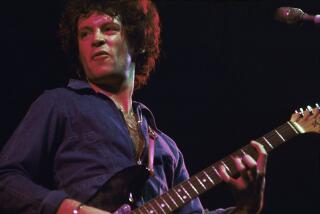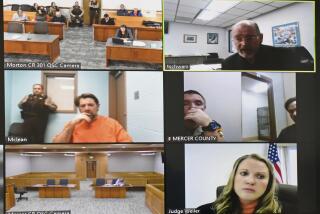Floyd Cramer; Country-Western Pianist
- Share via
Floyd Cramer, whose slurred, slipping piano notes nurtured a style that matured into the Nashville Sound, a repository of country, western and pop music, died Wednesday of the cancer he had been battling for six months.
He was 64 and died in Nashville, a city he helped give a prominent spot in the pop music firmament.
At his death he had recorded more than 60 solo albums, accompanied such giants of music as Elvis Presley on both his early and late hits, and with guitarist Chet Atkins and saxophonist Boots Randolph created what some call “countrypolitan,” a melding of rural twang and city sophistication that traversed political and economic spectrums around the world.
In addition to being Nashville’s first-call studio pianist, he carved out some hit singles of his own, among them “Last Date,” a 1960 recording that stayed at the top of the pop charts for several months before going “evergreen.”
His other hit singles included “San Antonio Rose,” “Fancy Pants” and “On the Rebound.”
It was Atkins acting as producer who first hired Cramer, a colleague on some mid-1950s records, to move to RCA Victor, a mainstream label where Cramer came to be heard on thousands of discs.
“He was just a wonderfully talented person and you didn’t have to struggle to get anything out of him,” Atkins said Wednesday. “He was just a natural-born talent.”
Cramer’s performance on “Last Date” has become a primer for piano students across the land.
“It’s a simple melody,” Cramer told the Associated Press in 1989. “It’s good exercise for both hands. You are playing solid left-hand patterns and a dominant melody with the right hand. It’s different and fresh to most piano students.”
Cramer was a natural for the combining of delicate style and country picking. He evolved a technique of adapting traditional guitar stroking (as exemplified by Mother Maybelle Carter and others) to the piano. “The style I use mainly is a whole-tone slur which gives more of a lonesome, cowboy sound,” he told the Encyclopedia of Folk, Country and Western Music.
“You hit a note and slide almost simultaneously to another. . . . You don’t hit the note you intend to right off, but you ‘recover’ almost instantly and then hit it. It is an intentional error and actually involves two notes. The result is a melancholy sound.”
Cramer’s early fascination with music produced a secondhand piano from his parents when he was 5 and growing up in Huttig, Ark.
After high school he auditioned for the radio program “Louisiana Hayride,” broadcast from Shreveport. He got the job and was soon working with Webb Pierce, Jim Reeves and Faron Young, and touring with such giants as Hank Williams. He also befriended another youngster new to the business--Presley--and backed him on concert dates in the ‘50s as well as on several movie soundtracks when Presley became famous.
Presley “was always very nice to work with,” Cramer said years later.
Cramer by then was doing occasional work in Nashville and while in the city on one trip met Atkins, who encouraged him to move there because the country music industry was evolving beyond an audience of the mildly curious and reaching commercial maturation.
By the 1970s, Cramer had moved beyond club dates and recording studios to concert halls, performing with major symphony orchestras and in musical theaters.
By then he had also become a featured performer on the “Grand Ole Opry” and was on national TV with Johnny Carson, Perry Como, Merv Griffin and others.
While few of his albums ever received star status on the Billboard and other recording charts, he had a loyal audience that bought his music in stores and more recently through television advertisements.
He was nominated often for country music’s highest awards, among them Instrumentalist of the Year.
Cramer reveled in the diversity of jazz, blues, gospel and light classical.
“Music is emotion, mood, regardless of what you name it,” he once said. “I wouldn’t want to be pigeonholed as playing only country or pop.”
More to Read
The biggest entertainment stories
Get our big stories about Hollywood, film, television, music, arts, culture and more right in your inbox as soon as they publish.
You may occasionally receive promotional content from the Los Angeles Times.










